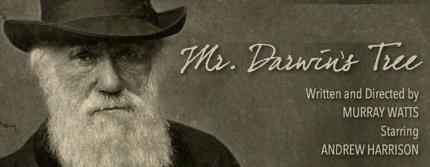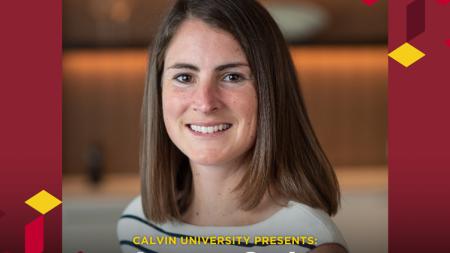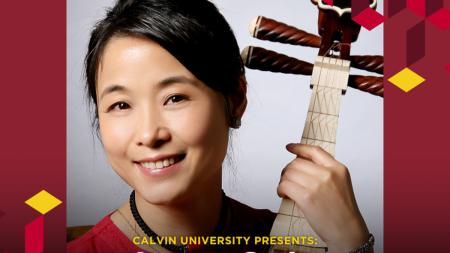Mr. Darwin’s Tree Comes to Calvin

Calvin University
Calvin University biology professor Ryan Bebej thought he knew a great deal about Charles Darwin, the groundbreaking 19th-century scientist who developed the theory of evolution and who will be featured in a one-actor play coming to Calvin University in late September.
But Bebej, one of those helping to bring the play Mr. Darwin’s Tree to Calvin, came across some surprises when he joined a tour of Darwin’s home south of London, England, this summer.
A recipient of a grant at Oxford University in England to study the relationship between science and religion, Bebej already knew that the popular caricature of Darwin as a man who coldly set out to destroy traditional belief in religion was not correct.
But on the visit in July to Darwin’s home, he discovered aspects that helped to give more insight into the man whom many religious authorities condemned for his theory, which ran counter to the traditional biblical teaching that God created the world in six days.
At Darwin’s home, called Down House, Bebej learned that, as a father, the scientist loved to walk in his expansive garden with his children playing on the path behind him. Also, Darwin built a special wooden toboggan inside his Victorian-style home so that his children could ride on pillow cases down the staircase.
“I didn’t appreciate what he had been like as a father,” said Bebej, whose grant is part of Scholarship and Christianity in Oxford, a project of the the UK Centre of the Council for Christian Colleges and Universities.
Also this summer, Bebej added, he learned that Darwin hooked up a system in his basement that he could use to call a person working in his house to come down come and play billiards with him.
The tour of Darwin’s home was only a sidelight of this summer’s work. Bebej and other scholars in the program had the chance to listen to and meet with well-known experts in the field of science and Christianity such as John Hedley Brooke, author of Scientists and Their Gods.
“John Hedley Brooke promotes the idea that we tend to oversimplify things when we think of people [such as Darwin],” said Bebej. “These people get much more complex when you go back and examine them.”
By attending Mr. Darwin’s Tree, which starts at 7 p.m. on Sept. 21 at Calvin’s Gezon Auditorium, people will have a chance to gain a deeper sense of the complexities involved in Darwin’s work and life, particularly the relationship between the divine and the world he studied, said Bebej.
Produced by Scholarship and Christianity in Oxford of the UK Centre of the Council for Christian Colleges and Universities and underwritten by the Templeton Religion Trust and the Blankemeyer Foundation, the play is touring college campuses in North America this fall. It was written by Murray Watts and features actor Andrew Harrison.
“I’ve seen the play three times, and I enjoy it every time I see it,” said Bebej, who will moderate a brief panel discussion following the play.
Darwin was born in Shrewsbury, England, on Feb. 12, 1809. In 1831, he embarked on a five-year survey voyage around the world on the HMS Beagle. During the trip, he stopped in many places, gathered specimens and took voluminous notes. He published The Voyage of the Beagle in 1839.
In 1859, basing his thoughts on his study of specimens and his correspondence with people from around the globe, Darwin published The Origin of Species, which detailed the theory of evolution and his views on the process of natural selection.
Playwright Murray Watts is a Christian and, said Bebej, seeks in Mr. Darwin’s Tree to show Darwin’s challenges, his concerns, and his commitment to the theory that he knew would cause controversy in the Christian church.
In the play, actor Andrew Harrison plays Darwin, but he also speaks to and portrays other people. As the play unfolds, Darwin is shown to struggle with big questions arising from his own experiences.
“We see that Darwin grew up with a faith. . . . But what faith he had was shaken when one of his daughters died,” said Bebej.
Thinking of what happened to his daughter and his own grief, Darwin kept wondering how such suffering could occur in a world ruled by a good God.
“We also see the interaction between Darwin and his wife, Emma, who was a devout Christian,” said Bebej. “He knew how much his theory would upset her.”
The play recounts how Darwin returned home after his journey on the HMS Beagle and, dealing with a range of physical ailments, remained there. He tended his garden and constructed a greenhouse, both of which he used for research. And he regularly wrote and received letters from others, not just scientists but religious figures as well, as he developed his theory of evolution.
“This play honors Darwin’s personhood. It can open the door for us to have a conversation that recognizes the humanity and image of God in him,” said Bebej.


